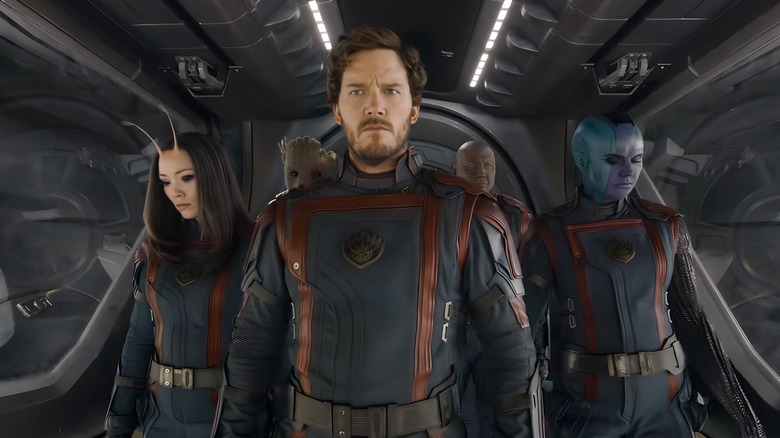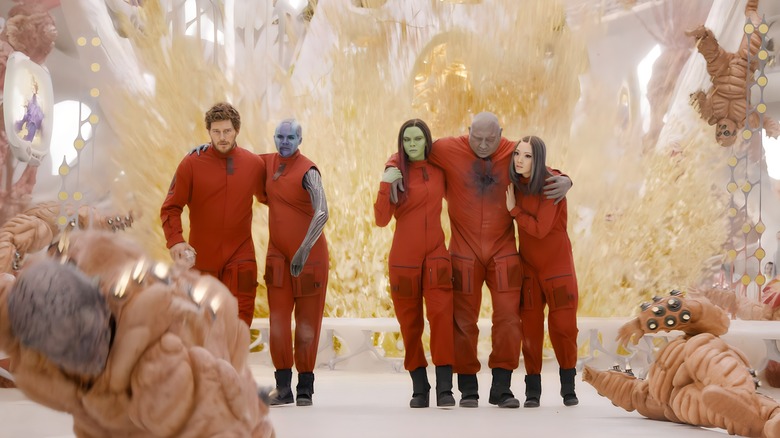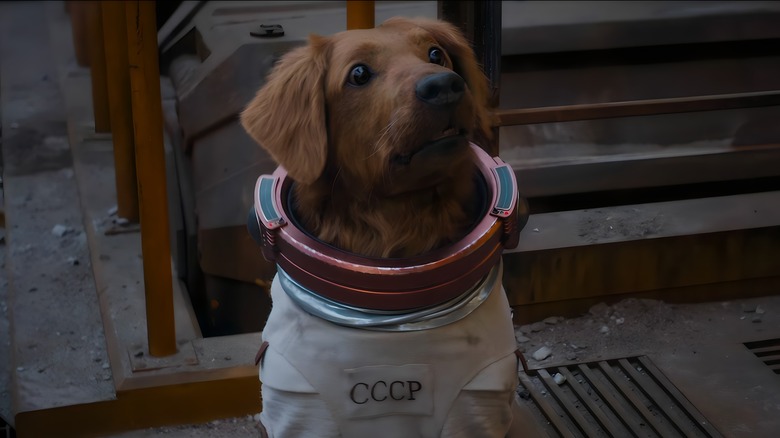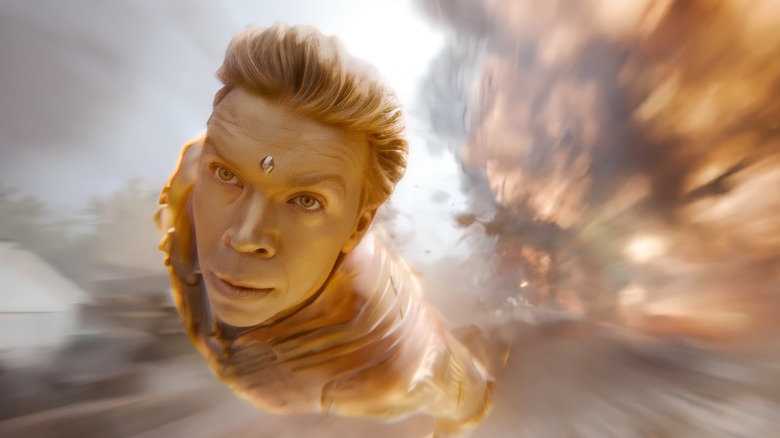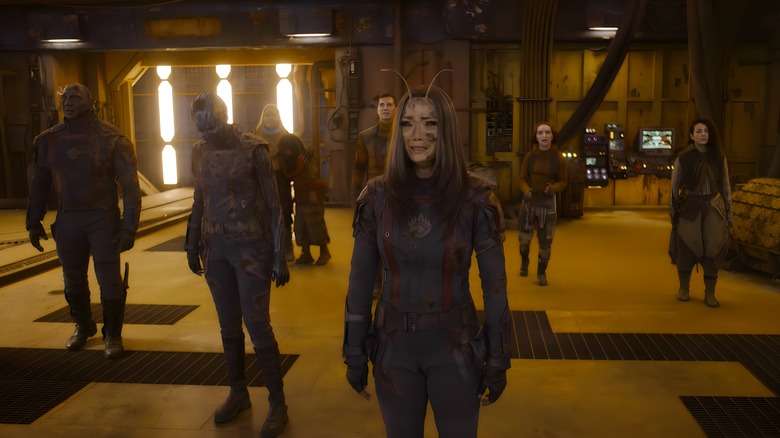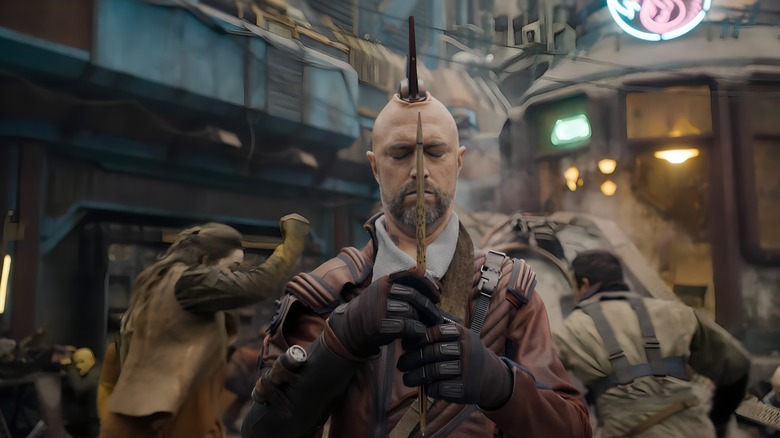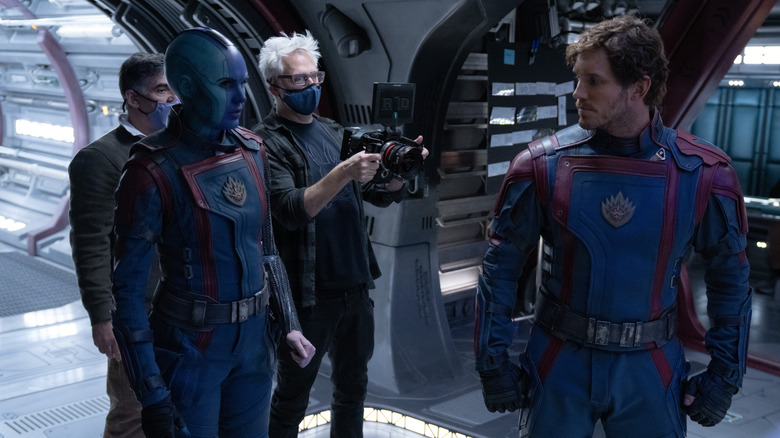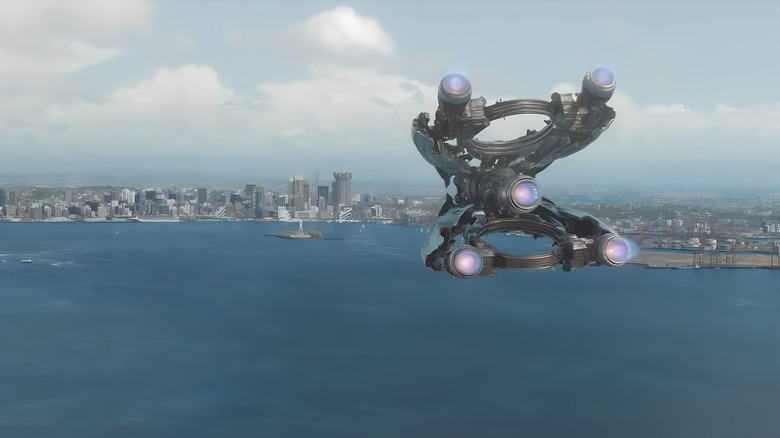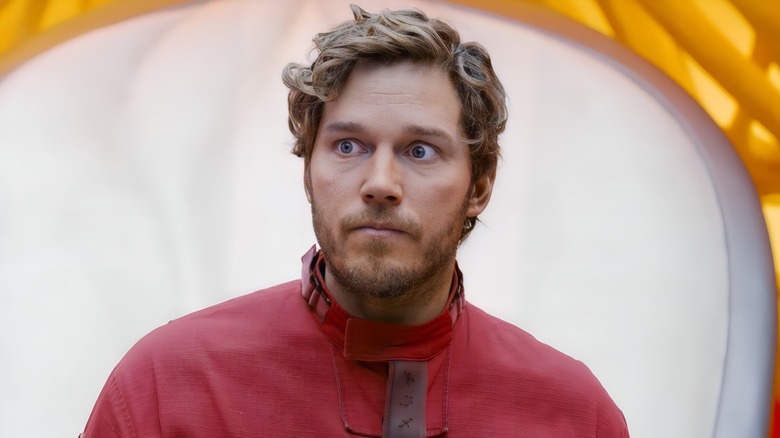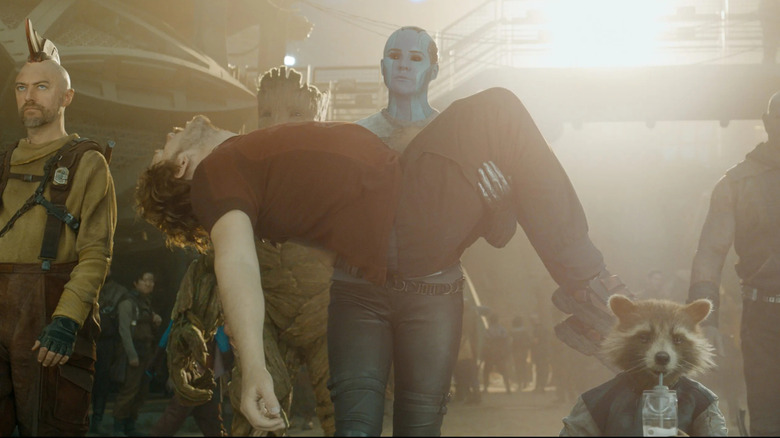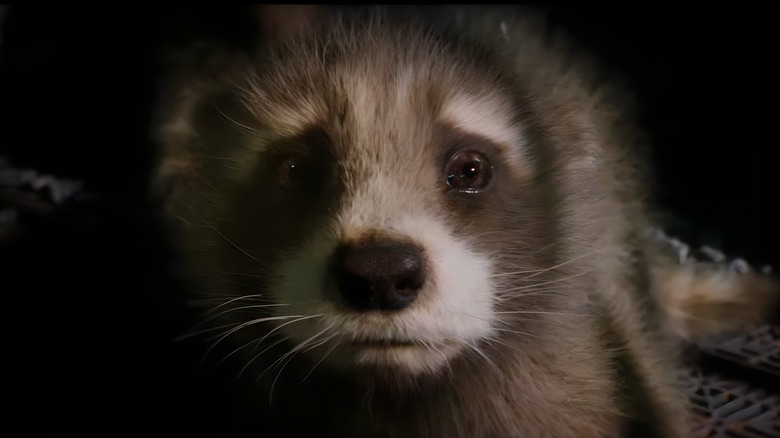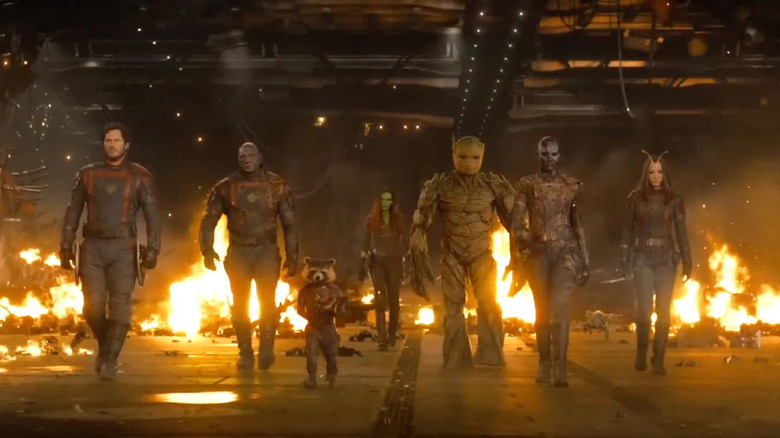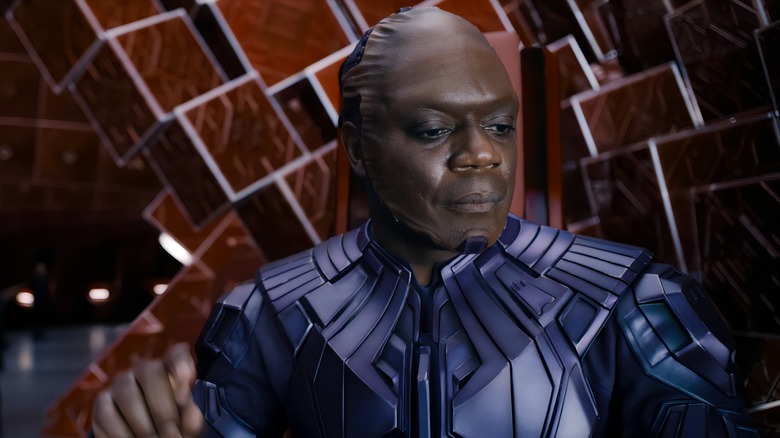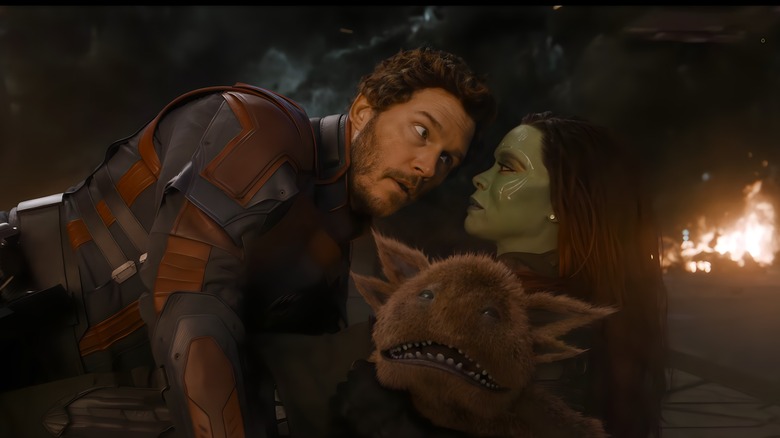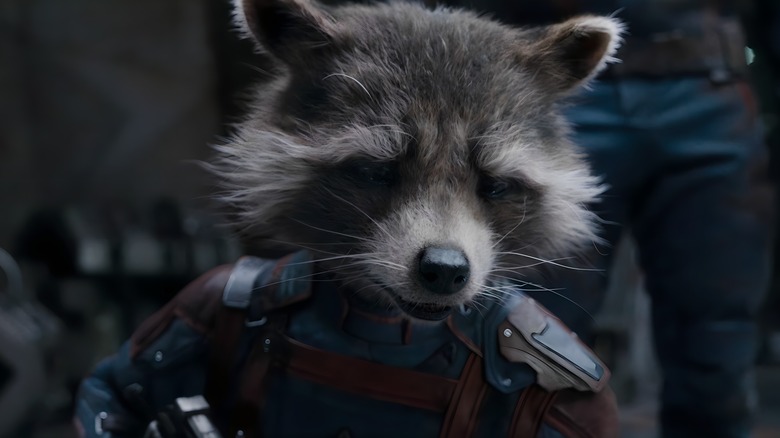Why Guardians Of The Galaxy Vol. 3 Blew Everyone Away At The Box Office
Contains spoilers for "Guardians of the Galaxy: Vol. 3."
What's that? A Marvel movie did well at the box office? You bet it did. "Guardians of the Galaxy: Vol. 3" blasted off in theaters on May 5 and didn't look back. By the end of its opening weekend alone, the film had raked in $289 million, $118 million of which came from the U.S. domestic box office.
The solid success of writer-director James Gunn's threequel had been doubted by some, especially after the lackluster reception of "Ant-Man and the Wasp: Quantumania" back in February. But the truth is, even though that movie got a less-than-stellar reception from critics and viewers alike, the tarnish of Ant-Man's third solo adventure clearly didn't rub off on the galaxy's favorite heroes, either.
Peter Quill, Rocket, and the rest of their gaggle of unlikely intergalactic superheroes had no problem piling up the zeroes at the box office on opening weekend. The crew had plenty going in their favor to make that happen, too. Here are just a handful of the reasons "Guardians of the Galaxy: Vol. 3" had such a strong showing in its first few days.
A strong initial response
One of the biggest factors that weighed on the release of "Ant-Man and The Wasp: Quantumania" was the fact that it hit a wall of negative critical reviews before it even reached its opening night. In contrast, "Guardians of the Galaxy: Vol 3" was buzzing the moment the early screenings started.
To be clear, the early reports weren't all sunshine and roses. On the contrary, there were plenty of reviews that were a mixed bag. But that didn't matter. While everyone is entitled to their opinion, the overwhelming message resonating from early viewers was simple: "Guardians Vol. 3" is one of the MCU's crown jewels.
The warm early reception did what studio executives everywhere are always hopeful for. It paved the way for viewers to flock to the cinemas to see if the critics were right. With so much buzz over the long-awaited third installment of one of the MCU's most beloved superhero posses, the strong initial response merely confirmed that everyone and their mother needed to see this thing as soon as possible.
Minimal competition makes things easy
The bulk of the factors on this list are positive attributes about the movie itself. But there's one obvious external reason the third "Guardians" film did so well: it didn't have any competition. On the contrary, James Gunn's third and final MCU installment arrived in cinemas that were desperate for a tentpole film.
For some perspective, "Guardians of the Galaxy: Vol. 3" came out on May 5th. "The Super Mario Bros. Movie" came out on April 5th. Despite coming out precisely one month apart, "Super Mario" was still the runner-up at the box office on Quill and company's opening weekend. The pair of leaders was distantly followed by other less popular options, like "Evil Dead Rise," "Are You There God? It's Me, Margaret," and newcomer "Love Again." Other long-legged cinematic runs were also on the docket as well, including "John Wick: Chapter 4" and "Dungeons and Dragons: Honor Among Thieves," which, again, goes to show how slim the theatrical pickings were on the first weekend of May 2023.
Despite the poor company, "Guardians 3" still showed its muscle. Even the second-place competition from the still-overperforming "Mario" only brought in $18.6 million — less than a sixth of the number one film's galactic-sized total domestic haul.
A (kind of) summer swell kickoff
Yes, "Guardians of the Galaxy Vol. 3" came out in early May, squarely in the middle of spring. Yet the trailers billed the film as an early summer blockbuster. The truth is, summer blockbusters don't care about hard calendar dates. Warm weather is here. Summer break is right around the corner. Vacations are on the calendar. The summer movie season has arrived, and the third "Guardians" installment capitalized on that fact.
The argument goes back and forth about whether the summer box office is all it's cracked up to be, and the 2023 summer slate is certainly a mixed bag. There's a smorgasbord of tentpole films and indie alternatives coming to theaters in the coming months, yet the post-pandemic theatrical slump continues to dog cinemas, making any summer success questionable until it's a bona fide reality.
Still, "Guardians 3" managed to pull some of that summer box office magic forward, even as it launched on an uncontested mid-spring release date. The result was a film billed as kicking off the supposedly impending "summer swell," which certainly didn't hurt the movie's must-see appeal.
The GOTG experience attracts a lot of casual viewers
The MCU started out simple. Easy-to-understand characters like Tony Stark and Steve Rogers experienced down-to-earth adventures that pitted themselves against, in most instances, small-scale opponents. While these movies were entertaining and iconic, they were often serious, with the humor sprinkled in rather than operating as a defining factor — a requirement for most fantasy films if they want to be taken seriously.
The immersive overtones of the MCU also alienated many viewers who were simply looking for a good time. Casual fans who wanted to enjoy their Saturday with a trip to the movies didn't approach films like "The Avengers" with the same investment as a Marvelite would.
"Guardians of the Galaxy" changed that narrative by offering fairweather fans a way to thoroughly enjoy a superhero movie without the need for the film to become overly self-aware in the process. The Guardians schtick is equal parts believable and comical. It's loaded with humor but unafraid to tackle giant storylines and deep emotional beats. The result is a viewer experience that satisfies the fandom while also attracting a heck of a lot of casual viewers — which is what makes the big bucks.
A tentpole film too big to fail
The theatrical experience isn't what it used to be. Before the pandemic, going to the movies was a common activity regardless of what movie titles were up on the marquee. While the idea of a "casual trip to the movies" was already contested by many moviegoers in 2019, the entire concept came to a screeching halt in 2020 due to the pandemic.
Since quarantines and social distancing requirements have lifted, theaters have had a slow and painful return to normalcy — and even then, the "new normal" for theaters is hardly reminiscent of the old one. Packed auditoriums are rare and only tend to happen when there is a truly big movie that will attract an audience, even if they haven't been to the theater in months.
"Guardians of the Galaxy: Vol. 3" fits the bill of a genuine tentpole film in a way that few others can. It's a large-scale story with A-list talent and glittering special effects that functions as the conclusion of a top property in an already wildly successful cinematic universe. There's nothing about "Guardians Vol. 3" that isn't tentpole by its very nature. Appointment viewing, tentpole films, call it what you like — by post-pandemic theatrical standards, "Guardians of the Galaxy: Vol. 3" was simply too big to fail.
James Gunn's last hurrah was appointment viewing
"Guardians of the Galaxy: Vol. 3" earns its value as a watchable movie purely on storyline credentials. But there is plenty of external drama that probably had viewers keen on attending a viewing as soon as possible, too. One of the most prominent of these was watching James Gunn's MCU swan song.
As the veteran director prepares to reboot Superman as part of his DC-focused future, fans were ready to flock to see his final directorial moments in Marvel's universe. The emotions were even higher for many who remembered Gunn's sudden dismissal from the franchise back in 2018 and his even more abrupt rehiring two years later.
Since Gunn's reinstatement, fans have anxiously waited to see what he would cook up for his last hurrah in the MCU — and the man didn't disappoint. He delivered a film laced with enough tears, both sad and happy, to double as a therapy appointment for the whiplash emotional trauma that preceded it.
The end of an epic trilogy
Back in 2014, the unexpectedly enjoyable narrative of the first "Guardians of the Galaxy" captured the hearts of diehard viewers and fairweather fans alike. The success of the first film was so great that it competed with obvious blockbusters like "The Avengers" in the hearts and minds of MCU audiences. Its sequel, while less popular, still built on the existing narrative, simultaneously creating more laughs and greater emotional stakes.
During the extended lull between the second and third franchise films, the bumblingly heroic group got tangled up in the "Infinity War" affair with the Avengers, where they lost Gamora and saw half of their crew snapped into thin air. They went through even more harrowing adventures in "Avengers: Endgame" before making a brief pit stop in Thor's fourth franchise film, then setting the stage for "Vol. 3" via a Disney+ Christmas special released in late 2022.
From their spunky origins to a Christmas-light-infused romp on Knowhere with Kevin Bacon, this ragtag team of heroes has seen it all. The fact that their third standalone film was heavily billed as the original group's last outing and the final chapter of their story made it an automatic trip to the theater on opening weekend for countless fans.
Connecting to the past and the future
The MCU is in the midst of a seismic shift. The first three phases of the cinematic universe — collectively billed as the "Infinity Saga" — officially ended in the wake of the Infinity Stones conflict with Thanos. Since then, Phase 4 has somewhat painfully made the transition back to a Phase 1 mentality. New heroes have been introduced in isolated stories that only occasionally overlap with the larger narrative. In addition, the use of Disney+ limited series alongside full-length feature films has disrupted and accelerated the traditionally slow build-up of past MCU storytelling.
Phase 5 is now underway, with Kang on the horizon and plenty of crossovers in store. Yet the shift from the classic Avengers to a new stable of heroes remains shaky. That's where a group like the Guardians of the Galaxy becomes invaluable. The team simultaneously connects to the past and projects into the future. A movie like "Guardians Vol. 3" brings a boatload of nostalgic vibes while also building up to the storylines and stakes of future films. This isn't just a reality that is helpful behind the scenes. Fans feel it too. The ability to live in the comfort zone of past experiences while getting amped for future possibilities gave "Vol. 3" a dual attraction that is hard to find in the MCU at the moment.
Who's gonna die?
One morbidly fascinating factor that doubtless drew many viewers to see "Guardians of the Galaxy: Vol. 3" on opening weekend was the question of who was going to die.
While there are multiple death scares, particularly for Star-Lord and Rocket, it's clear by the time the credits roll that no one from the original gang is resting six feet under ... or whatever the frozen floating space equivalent of that is. Yet the question of which of the original gang was going to shuffle off this mortal coil was in the air for months leading up to the film's release.
The trailers showed clips of Nebula carrying a limp Star-Lord. Rocket is shown surrounded by white light. There's a snapshot of Quill screaming in grief — the kind you only express when you've lost someone very dear to you. The signs were there, and while they ended up being red herrings in classic MCU fashion, they motivated a lot of information-age viewers to get up off the couch and hightail it to the nearest big screen before they saw a spoiler online.
Who is Rocket? Let's explore
Rocket is one of the OG Guardians of the Galaxy. He's been there from the beginning when the crew bumped into one another on Xandar. He bonded with his new family and suffered through losing them in The Blip. Yet despite his steady presence, cynical humor, and endless devotion to his friends, we didn't really know who the MCU's version of Rocket was ...until "Vol. 3."
The promotional material made it clear early and often that the third "Guardians" movie wasn't just a send-off for the original team, but also an homage to Rocket. The raccoon (it's official now, he really is a raccoon) was an underdeveloped character that was near and dear to the director's heart. In a 2022 interview with EW, Gunn explained his motivation for shining a spotlight on the Guardians' smartest member. "One of the reasons why I came back to [make] this movie was because I felt like I needed to tell Rocket's story," he said. "I would've been very sad not to complete the trilogy for many reasons, but I just feel very connected to Rocket. I feel like nobody would be able to tell his full story if it wasn't me."
Gunn may have a special affinity for Rocket, but there are millions of fans close behind him. The ability to get some unspoiled deets on the Trash Panda's past was too good to miss.
Another installment on the Groot-meter
Groot has literally had one of the most transformative trips of any MCU character. While the stoic nature of Groot's race has remained intact throughout the arc of his character's evolution, the rest of him has changed every time we've seen him. The original Groot from "Guardians of the Galaxy" went down in a self-sacrificing ball of arboreal glory as the team saved Xandar from an Infinity Stone-wielding Ronan the Accuser. By the end of the film, an offshoot of the hero was growing in a planter.
In "Vol. 2," Baby Groot is dancing around with toddler-like innocence. "Infinity War" features a teenage Groot obsessed with himself and uninterested in helping unless he has to. By the "Guardians of the Galaxy Holiday Special," Groot is looking all grown up — and in his prime.
One of the small-yet-significant draws of a third "Guardians of the Galaxy" flick was the fact that we could see where Groot is in his ever-growing evolutionary state. It turns out that we get two iterations for the price of one. Initially, Groot is in his young adult phase, and he remains that way for the bulk of the movie. However, in one of the end credit scenes, we're treated to a super-sized version of the character. Whether he's a happy-go-lucky sapling or a living tree fort, gauging where the character is on the "Groot-meter" has become a fun revelation with each Guardians appearance.
Getting to know a nasty new villain
Thanos was an incredible antagonist for the entire MCU. It's extremely difficult to build up a multi-movie villain and have the pay-off feel like it was worth it. (Good luck, Kang.) One-off villains often shine brighter, especially if they're well-written and executed characters. This was the case with past enemies, like Michael B. Jordan's Killmonger and Cate Blanchett's Hela, and it's the same with Chukwudi Iwuji's The High Evolutionary in "Guardians of the Galaxy: Vol. 3."
The High Evolutionary is a detached and lofty villain who is compelling and horrifying all at once. While less relatable than other antagonists, the character is terrifying in a cold and calculating way (interrupted by bursts of emotional fervor) that makes him the stuff of nightmares. Iwuji brings The High Evolutionary to life in an incredibly believable way, with a performance that ranks amongst the best that the MCU has given us in years. The High Evolutionary may go down with his planet-sized ship, but his one-time performance is one that intrigued viewers everywhere and made an already attractive movie that much more interesting.
Gamora and the multiverse experience
While it may feel like a blast from the past, "Guardians of the Galaxy" is technically part of Phase 5 of the MCU. This puts it squarely in the middle of the current uber-narrative arc, called the "Multiverse Saga." Admittedly, the third installment doesn't have much to do with crossing multi-dimensional planes of existence, but it does help pave the way for the increasingly complex storytelling that's coming down the pike.
This primarily finds expression through Gamora's part of the story. By "Vol. 3," the Daughter of Thanos isn't herself anymore. In fact, she's a past iteration of Gamora from 2014's "Guardians of the Galaxy" storyline, transplanted several years into the future. The original Gamora died in "Avengers: Infinity War" at the hands of her adopted father — an event that her hero family (especially Quill) is still processing.
The interactions and storytelling between this "reset" Gamora and the rest of the Guardians is a nice, contained testing ground to explore how to use the silver screen to tell meaningful multiverse narratives that actually matter. Of course, the fact that the Gamora storyline was already teased in "Avengers: Endgame" made it something fans were invested in watching play out as soon as possible.
It's Marvel, guys ... what did you expect?
There are many elements that have factored into the early success of "Guardians of the Galaxy: Vol. 3." From light-hearted humor to complicated characters, nostalgic overtones to impeccable timing, the movie was set up for success from day one.
Even if all of these things hadn't been in play, though, there's one overarching factor that made the film's box office success inevitable: it's Marvel. The MCU has become the defining benchmark of cinematic triumph in recent years. It appeals to everyone and has created an army of invested viewers that are addicted to getting their next MCU "fix."
Whether that's a good or a bad thing is beside the point, as is whether or not the MCU has arguably peaked. Critics can critique and naysayers can disparage as much as they'd like. But at the end of the day, every Marvel movie that comes out at this point has as good a shot as any to smash a box office record.
